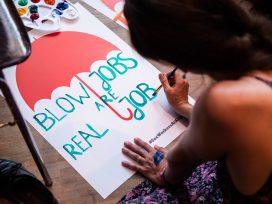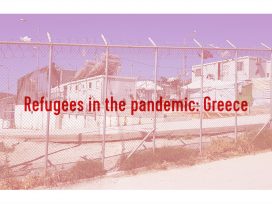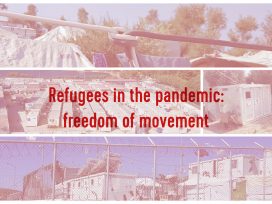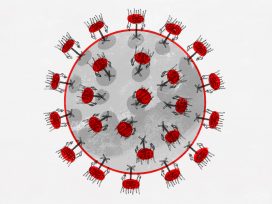Democracy and the Great Pestilence
Sensationalism has focused on fistfights over toilet rolls, but the real story is the withdrawal of democratic oversight, and how little public resistance there is to the declaration of martial law. Power granted is power conceded; and power relinquished is power reclaimed with difficulty.
Updated on 15 May 2020.
Our world has been ravaged many times by pestilence, yet every season of disease is a life-pounding moment when normality flounders, anxieties flourish and thoughts turn darkly inwards. Pandemics tear apart old habits. They break hearts. People grow fearful. Death looms. Certainties are tossed to the wind. Amidst the pain and panic, people naturally want to make sense of things, so what can we say about the causes, effects and historical significance of this Great Pestilence? Some answers are already squarely on the table.
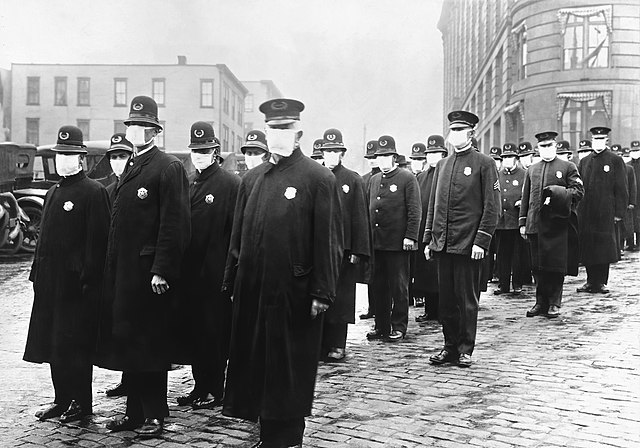
Policemen in Seattle wearing masks made by the Red Cross, during the influenza epidemic. December 1918. Photo from Wikimedia Commons.
Plagues typically strike without warning, but this one, though sudden, is different in several important ways. Most obviously, it teaches us that riders of pale horses don’t always appear after wars, as was the case in the ill-named 1918-1920 Spanish flu, a pandemic that more likely began in Kansas and later infected an estimated 500 million people, at the time one-quarter of the world’s population.1 Our Great Pestilence is a product of peacetime, which is one reason why initially it bred complacency, and denial. Several months into the pandemic, more than a few politicians and millions of citizens still did not believe it was happening. Dogged in their stupidity, thinking only of themselves, they were sure that it was all a hoax, or a media-hyped exaggeration whose falsity would soon be exposed. It’s as if they had a secret attraction to the pestilence – perhaps even, as Charles Dickens suggested in A Tale of Two Cities, a weird passing inclination to succumb to the virus, or watch others die of it.
In this new pestilence, the scapegoats are also different. Thousands of Jews were murdered after being accused by municipal governments, bishops and the Holy Roman Emperor of spreading the bubonic plague in mid-14th century Europe.23) Jews were again targeted in the first recorded speech of Hitler, delivered in 1919 in Munich’s Hofbräukeller, where they were accused of ‘lust for money and domination’ and spreading ‘racial tuberculosis among nations’.Ian Kershaw Hitler:1889-1936 Hubris. (Harmondsworth 1998), p. 140 Today’s targets have not yet included on any scale Jews, or black or indigenous people. Disabled citizens, the poor and LGBTI people have been spared. So far, all these groups are lucky.
It may be that the ‘democratic’ qualities of this highly contagious virus, its remarkable ability to strike down every person indiscriminately, anywhere, sweeping up the likes of Harvey Weinstein, Boris Johnson and Prince Charles, reduces the scope for stigma. Perhaps civil societies of the old democracies of our generation have learned lessons about the importance of remaining civil. Time will tell, even though there is already troubling evidence that the first poisonous fruits of prejudice are beginning to ripen.
Senior citizens in several countries are now the target of triage policies designed to take pressure off overloaded public health care systems; there are even eerie public suggestions, notably by Texas Lieutenant Governor Dan Patrick, that ‘grandparents’ should be willing to sacrifice themselves for the sake of jobs and economic growth.4 India’s mainstream media is running stories blaming Muslims and their mosques for spreading the virus and plotting terrorism. A noxious new Orientalism is in its early stages. In London and Brussels, Copenhagen, New York and other cities inflammatory talk of the ‘Chinese virus’ is backed by the verbal abuse and beatings of Chinese people, simply for doing the right thing by wearing a mask in public, or just for being Chinese. 5G mobile phone masts in the United Kingdom are vandalised and telecoms engineers are abused by conspiracy activists sure that bandwidth improvement and the virus are joint Chinese government plots to capture the country. Hateful memes and snide slurs against Asians more generally are spreading through platforms like 4chan, Gab and Telegram.
In a foul twist of fate, Orientalism goes viral in the East. #ChinaVirus trends on Twitter in India, where gurus say publicly that the people of China are being ‘taught a lesson’ for ‘torturing animals’ and drinking bat soup. More than a few Indian voices affirm that the pestilence is a bio-weapon used by the Chinese to secure their global dominance. At the United Nations Human Rights Council, the chair of the All India Bar Association and president of the International Council of Jurists, Dr Adish Aggarwala, has launched a case against China’s commitment of ‘grave offences against the humanity throughout the world’.5 Beijing’s new breed of ‘wolf warrior’ diplomats strikes back at such moves in strident tones. Chinese friends tell me there’s no shortage of online racist mutterings alleging that the virus originated in the United States, or in Europe. There are even Chinese whispers suggesting that salad-eating Westerners are to blame for the continuing spread of the virus. Like hot potatoes that warm the hands of people who quickly pass them on, such canards do more than lend new meaning to the old phrase salad days. They send gado-gado-loving Indonesians and Thais who fancy green papaya salad into paroxysms of raucous laughter.
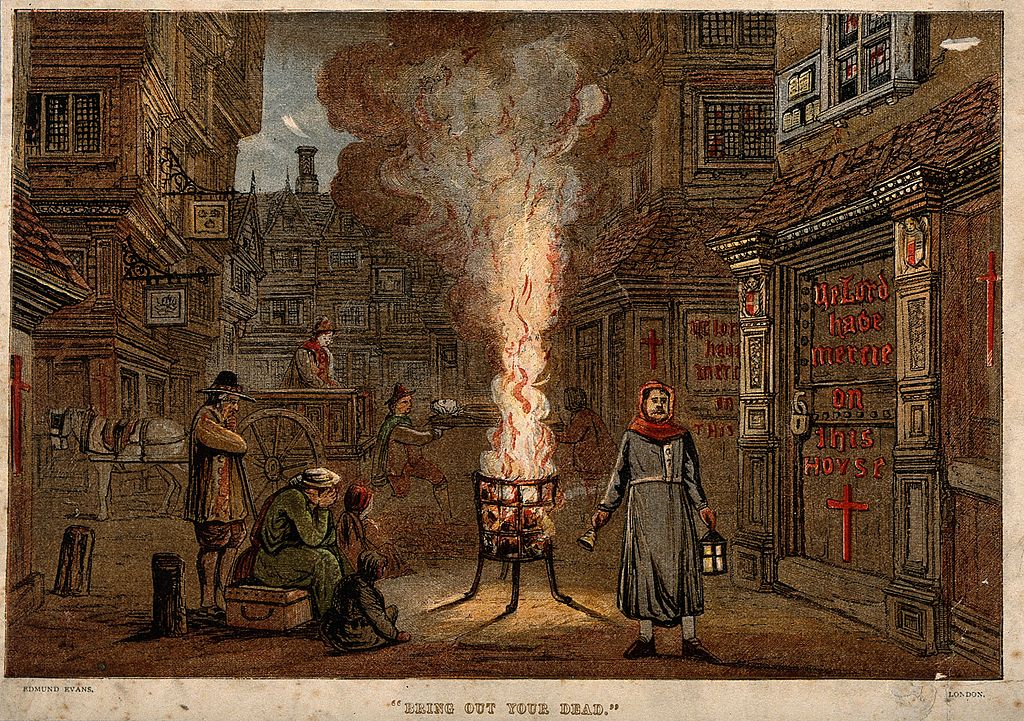
‘Bring Out Your Dead’ A street during the Great Plague in London, 1665, with a death cart and mourners. Photo via Wellcome Images from Wikimedia Commons.
Overnight Socialism
Albert Camus’s The Plague (1948) and José Saramago’s Blindness (1997) remind us that seasons of pestilence bring out the worst of humanity. Indifference towards others, violence against women and petty greed flourish. Other human beings, their touch and body and breath, their mere existence, suddenly become repulsive. The point certainly applies to our Great Pestilence, but again the rogues are different. Media platforms have hyped the panicked hoardings and mad fist fights over toilet rolls in crowded shops. The sensationalism hides the fact that the real rogues are to be found elsewhere.
Among the great lessons of this pandemic is that the four-decades-long era of neoliberalism is responsible not only for such decadence as the widening gap between rich and poor, compulsory austerity following the near-collapse of the banking system, global warming and species destruction. We now see that blindly pro-market governments have on their charge sheet the running down of public health care systems and shifting health risks and debts onto individuals and households. The scandalous result is that in many settings, including the richest countries on our planet, public medicine is under-prepared and overloaded. That is why the army has had to be drafted in to deliver emergency supplies to St Thomas’s Hospital in central London; why the French government has converted TGV trains into mobile hospital wards; and why doctors in New York hospitals beg for deliveries of respirators while ordering refrigerated trucks to remove the patients they weren’t able to save. It is also why the Great Pestilence has ravaged the wasteful and ill-organised American health care system, an estimated 30 – 40 per cent of whose hospitals are now suffering near-term risk of bankruptcy in a country that annually spends 17% of its GDP ($3.6 trillion) on health care, by far more than any other country on our planet.6
We are bound to hear much more in the coming months and years about capitalist greed and private profiteering and why the cult of possessive individualism must be brought under political controls backed by more robust and resilient public service institutions. In this sense, the great disruption triggered by the new pestilence differs from that of 2008. Then whole systems were rescued by massive injections of state funding followed by the imposition of austerity on citizens. It was socialism for the rich, dog-eat-dog, sink-or-swim capitalism for the rest.7
The Great Pestilence is different. Since it potentially touches and steals the lives of everybody, bailing out business, big banks in particular, is not enough. This time citizens have to be bailed out as well. Stoked by fears of millions of deaths and another 1930s-style Great Depression, which is now looking probable, there are direct payments to individual citizens, increases in unemployment benefits, food parcels, mortgage repayment freezes and stops on evictions. Who eventually pays for this overnight socialism is, of course, a political matter yet to be decided. We can be sure that plans are being drawn up to reimburse the rich and make the poor pay; and that in countries such as the United States and Britain large corporations and governments will do everything they can to leverage the looming economic pestilence to their advantage. Daniel Defoe’s warning in Due Preparations for the Plague (1722) remains timely: plagues spawn market profiteering (‘vice in our commerce’) by the rich and ruthless.8 A taste of the future is perhaps the way the Greek government is handing out lavish ‘stay at home’ advertising contracts to private media firms and paying private research institutes, rather than universities and public research centres, to do virus testing. Or the way the Trump administration’s US $660 billion Paycheck Protection Program (PPP) has showered greenbacks on large, publicly traded corporations – at the expense of small businesses that were supposed to receive direct payments designed to retain employees on their payrolls.
The age of neoliberalism has not come to an end. But, for the moment, elected governments in both the Atlantic and Asia Pacific regions have suddenly set aside their affection for unbridled capitalism. With little or no resistance from the rich, a new era of socialism, backed by fears of economic collapse and mass death, and trillions of state dollars, has suddenly triumphed. As the Great Pestilence morphs into a new Great Depression of disrupted supply chains, collapsing businesses, rising unemployment and the spread of precarity, especially among young people, history seems to be on its side.
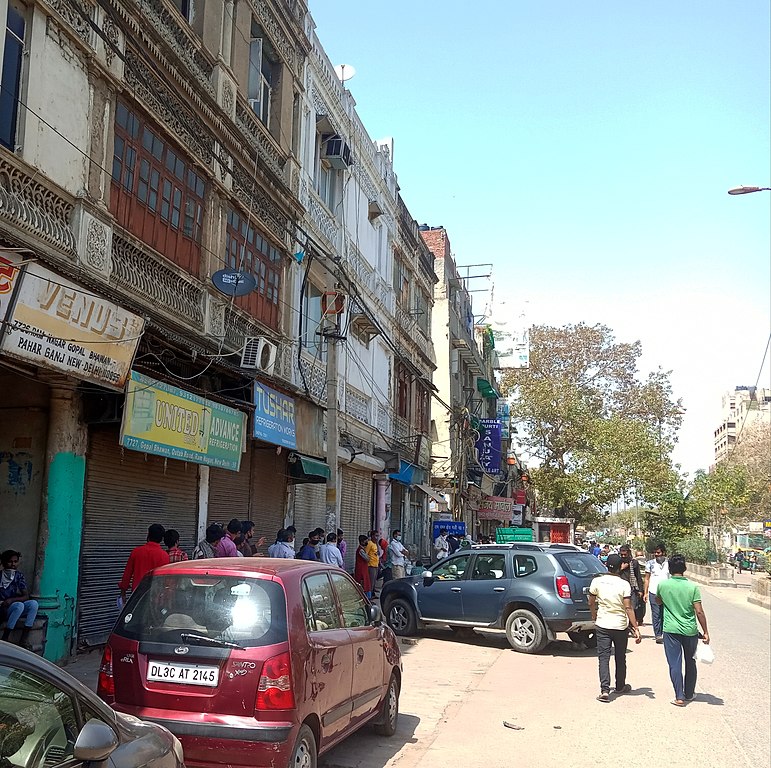
Migrant workers stand in a queue for food at Delhi Govt school during COVID-19 Lockdown at Delhi Photo by Goutam1962 from Wikimedia Commons.
The overnight socialism certainly doesn’t bring paradise to earth for citizens. Access to testing clinics, childcare facilities, internet bandwidth, food and adequate living space are maldistributed. Rates of domestic violence against women and levels of family unhappiness are spiking. In Narendra Modi’s India, a 3-week ‘people’s’ (janata) lockdown ‘to save its every citizen’ has bred hoarding of food, supplies and medicines among the middle and upper-middle classes and foisted homelessness, destitution, chemical spraying and police beatings on tens of thousands of migrant workers. In this Great Pestilence all are equal but some are very much more equal than others.
And yet, despite the greed and cruel injustice, there’s arguably something of deeper significance within the overnight socialism embraced by most of the democratic world. Striking is the skittishness of elected governments worried by their vulnerability to citizen disaffection and discontent. It’s not only that the virus is democratic. Governments everywhere are jumpy. They know their power rests ultimately on the consent of the governed. The Great Pestilence has forced them to see that anxious and vulnerable citizens won’t accept another round of austerity simply because, in these new circumstances, iron-fisted cutbacks would mean not just mass pauperism. Austerity would bring mass death.
Leadership
Future historians will tell us whether this period proves to be the moment when the modern Atlantic world’s prideful aversion to death and celebration of life was again exposed for its double-sided hypocrisy, as it was briefly during the wars in Vietnam and Iraq, but this time on a much more extended scale. Death is no longer out there in faraway places. It can no longer be attributed to ‘terrorism’ or hidden away in highway statistics and backroom torture chambers using methods that leave no marks.9 The grim reaper is now squarely in our midst. Scythe in hand, it prowls freely through our ranks, invisibly absent but palpably present, everywhere.
The ubiquity of death helps explain not just the overnight socialism and the nervousness of governments but also the new difficulties elected leaders are facing in explaining their actions to citizens. The Great Pestilence cries out for leaders who are good at motivating citizens by winning their respect. True democratic leaders display a radiance of style.10 They listen. They are practiced in the art of knowing when to be silent. True leaders learn from others. They know and respect the value of experts, wise people (as Niels Bohr said) who remind them that they don’t know everything. Good leaders are wise in turn: they are not blinded by expert advice and scientific data, which they know to be incomplete, constantly mutating and subject to disputations. Genuine leaders are level-headed and inwardly calm. They know how to poke fun at themselves, but they refuse to be clowns. They are not biddable. When the chips are down, as they now are, true leaders are rock steady. They have the courage to face up to hard realities and to make difficult judgments about how best to save lives while protecting citizens from social and economic ruin. They avoid demagoguery. They don’t worship power for its own sake. Above all, true democratic leaders humbly acknowledge their deep dependence upon the people known as the led. They don’t try to drag citizens by their noses. They lead people by persuading them to look up to their leaders.
Whether under these pestilent conditions countries such as the United States can in future produce true leaders, in sufficient quantities, at all levels, remains to be seen. For the moment, it’s only clear that some performances no longer work. Lies and bullshit are suddenly disgraced. Dissemblers and buffoons look ridiculous. Those who promise ‘miracles’ are jeered. Prevaricators are cursed. Some leaders look like criminals who deserve nothing less than trial and lock-up for trying to keep their countries open for business, for instance by telling voters they can expect to ‘lose loved ones’ (Boris Johnson), insisting workers ‘return to normality’ (Jair Bolsonaro) and peddling the doctrine of ‘herd immunity’, the death-dealing belief that since people have a natural right to ‘keep a reasonably normal life’ (Anders Tegnell) long-term economic growth and budget cuts to state health care systems are best promoted by letting the virus spread and boosting short-term death rates.
Emergency rule
It’s possible that in the coming months and years fake leaders, more than in any previous pestilence, will be shamed and punished for their business-is-business, merchants-of-death performances. The outbreak and spread of the pestilence is happening after all in the age of communicative abundance and monitory democracy.11 The whole of life is media-saturated. Elections are losing their centrality. In their place, a plethora of public watchdog and barking-dog institutions ensures that power comes under media scrutiny, as never before. This fact again marks off the Great Pestilence from, say, the Russian and Spanish influenzas, which were reported and hyped for the first time globally by the slow-motion means of telegraph messages, steamboats and newspapers. Our pandemic is by contrast a bullet-speed, night-and-day global media event that arouses fears of sickness and death on a scale and depth never before witnessed.
Marshall McLuhan famously noted that media technologies shape and ‘amputate’ our bodies.12 They reconfigure the body’s sense of up and down, here and there. The automobile threatened the culture of walking; the telephone extended the voice but amputated the art of letter writing. Today, without precedent, local and global multi-media platforms do more than reshape our bodies. Searching for audiences and advertising revenues and reputational advantage, they frame the Great Pestilence as a threat to the whole body politic.
Journalists report that 80% of the time the new virus is a mild disease, except for people who suffer underlying ailments such as diabetes and cardiovascular disease. But they also report that the new contagion is 10-20 times more deadly than a seasonal flu, and that it spreads on a scale well beyond previous viruses, such as SARS and MERS and HIV. They note as well the unknowns: that nobody yet knows the extent of asymptomatic ‘silent carriers’ of the virus, how many survivors will be left with chronic heart and kidney disease, or whether the new virus burns out, as with measles, or returns with a vengeance, in waves or cycles, as happened in the 1918 pandemic flu.
Exactly because monitory democracies enjoy open media coverage, they are especially vulnerable to reports that spread rumours and fears of annihilation. Thucydides’ noted in History of the Peloponnesian War (431 BCE) that the typhus plague that killed nearly a third of the citizens of democratic Athens wreaked political havoc. As people ‘died like sheep’, word-of-mouth rumours encouraged survivors to live recklessly, just for themselves. Disrespect for morals, ‘sacred as well as profane,’ flourished. There resulted a ‘greater lawlessness’.13
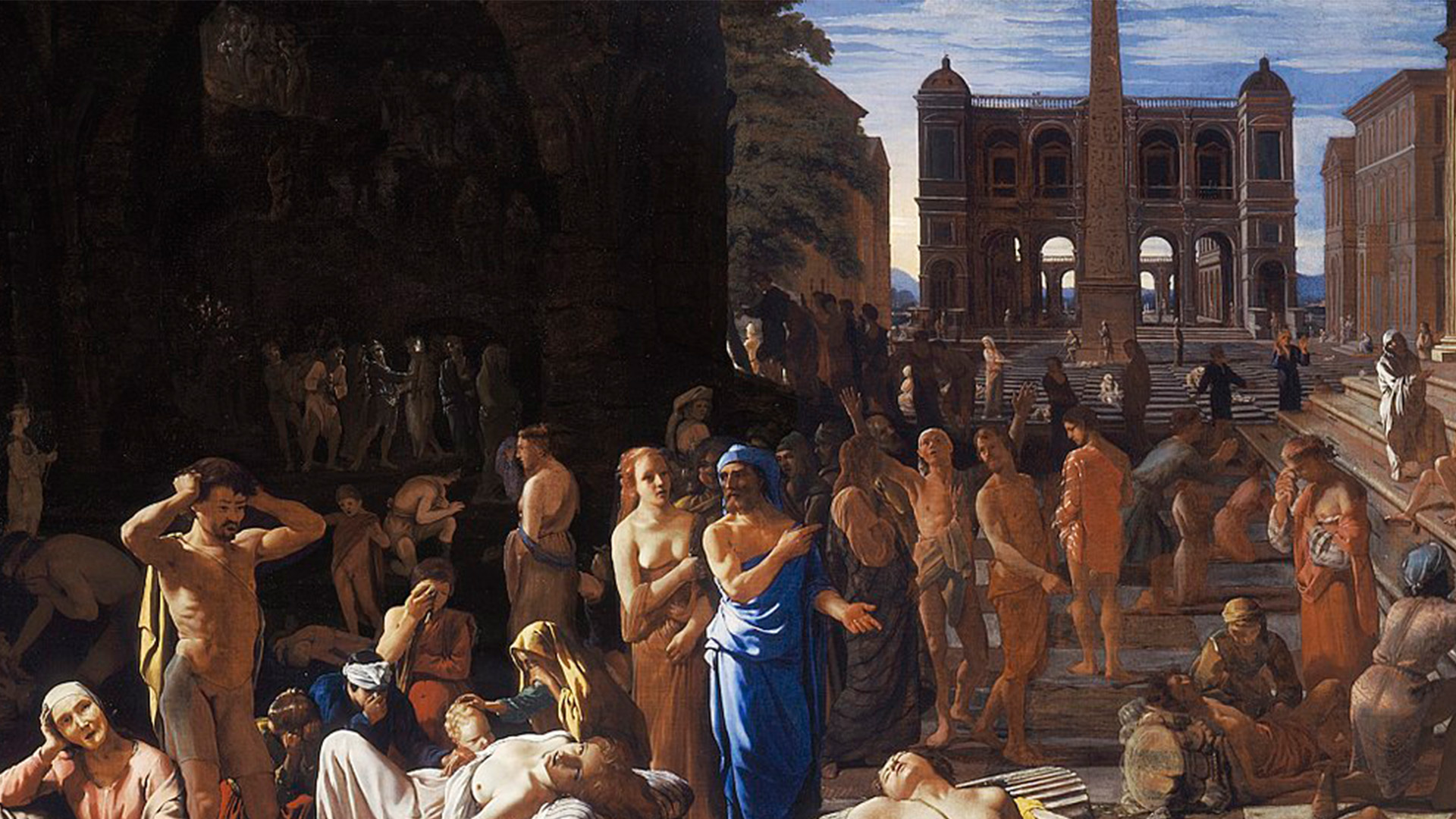
Plague in an Ancient City, by Michiel Sweerts, circa 1652. Photo via LACMA on Wikimedia Commons.
Our Great Pestilence does damage to democracy, too, but in different ways and on a scale that comes as a great surprise. Mediated fears of sickness and a ‘pestilential mortality universally hurtful’ (the words are from Giovanni Boccaccio’s Decameron14) offer governments the chance of seizing the moment, to insist their citizens must now be protected from death by imposing emergency rule. Their logic seems simple, and compelling. We sink or swim together. Survival is perforce a collective obligation. Sovereign rule is mandatory.
Without warning, in the twinkle of an eye, the upper structures of power-sharing, monitory democracy are shelved. ‘When you engage in war, you engage completely, we mobilize united’, says Emmanuel Macron.15 That means: war on the tiny inside enemy that wears a coloured crown necessitates war-time restrictions. Public gatherings must be limited to ten, five, four, three, two citizens. Whole cities become vast spaces of emptiness. School closures have sent more than half a billion children home, says UNESCO.16 Parliaments that might otherwise function as early warning detectors and representatives of stressed communities are prorogued. Cinemas, restaurants, bars, clubs, gyms, mosques, synagogues, churches and temples are also prorogued. Public events are cancelled. Election rallies don’t happen. In the skies of southern California, Chinese-made drones fitted with cameras and loudspeakers ensure that citizens stay locked inside their homes, except for essential trips. More old-fashioned methods are used in countries such as Italy, France and Spain, where hundreds of thousands of police and army officers patrol the streets. India’s Uttar Pradesh government is using a colonial-era Epidemic Diseases Act to crack down on dissidents. In Kenya, dusk-to-dawn curfews are reinforced with tear gas and batons. The scheduled referendum on changing the dictatorship-era constitution of Chile has been postponed. And almost everywhere, it seems, the time has come for unelected crisis-management bodies sporting war-time names. In Australia, whose national parliament has been mothballed for five months, the Great Pestilence initially gave birth to the National COVID-19 Coordination Commission (NCCC), an unelected body chaired by a former mining corporation magnate and answerable only to the Prime Minister. Following political wrangling among political elites, it was replaced by the National Cabinet, a body comprising the head representatives of the federal, state and territory governments.
As the virus began to spread, the list of state emergency procedures grew longer by the day. Demagogues began to peacock. Impeccably plumed with long tails, opportunists like Viktor Orbán and Narendra Modi arrogated to themselves unlimited powers of ruling by decree and imposing tough new penalties on those accused of spreading ‘fake news’ or violating quarantine. Seeds of confusion about how to stage elections have been officially sown. The time is surely coming when we hear that scheduled general elections must be postponed, or scrapped.
There are signs of public agitation against emergency rule, it’s true. In over a dozen American states, death-defying protesters, some of them armed, most of them supporters of a populist president promising redemption, have taken to the streets, bearing placards, blocking roads and honking car horns in support of ‘re-opening the economy’. Elsewhere there are democratic linings in the dark clouds. In many different global settings, millions of people have come to be been gripped by a strong sense of social solidarity, or what South Africans call ubuntu, an ethic of interdependence (‘I am because you are’). Pots and pans are banged and songs of solidarity are sung by citizens on balconies and pavements. The pestilence fosters much social goodness and citizen generosity, which is why the meme phrase social distancing is misleading. Physical distancing is indeed the reality, but thanks to the widespread use of digital networked media social bridging and bonding is happening, in unexpected ways. It’s possible that more robust, less commodity-driven and money-hungry civil societies are waiting in the wings. It’s even thinkable that there might be a permanent upgrading of remuneration and public respect for the key workers – nurses, doctors, teachers and cleaners, ambulance and delivery drivers, nightshift toilers in warehouses, call centres and supermarkets – who are ensuring that whole societies survive this pestilence. For now, it’s safe to say that citizens are getting inventive. They petition governments and crowdsource funding and support for the hungry and harassed on Twitter, convene social gatherings and drinking parties on Skype, and meet and get married on Zoom. There are calls for a basic citizens’ income and plenty of talk of the need permanently to slow down everyday life, to cut carbon emissions, reduce noise and to let the birds carry on singing. But equally striking – truly shocking – is just how little organized public resistance there is to the near-universal declaration of martial law.
Matters aren’t helped by the silence and compliance of pundits who justify the clampdowns using language drawn straight from the classic works of anti-democracy. Sadly typical is the way a Cambridge University professor spins love of Thomas Hobbes’s Leviathan (1651) for its insight that ‘the essence of politics’ is that ‘some people get to tell others what to do’. David Runciman adds: ‘Under a lockdown, democracies reveal what they have in common with other political regimes: here too politics is ultimately about power and order.’17
Such justifications of emergency rule are both dangerously naïve and ignorant. Unless they are resisted, concentrations of arbitrary power always display a definite stickiness. As temporary measures, they easily become permanent arrangements. Power granted is power conceded; and power relinquished is power reclaimed with difficulty. Emergency rule gets people used to subordination. It nurtures voluntary servitude. It is the mother of despotism and, as Percy Bysshe Shelley observed in Queen Mab (1813), arbitrary power, ‘like a desolating pestilence’, which strangely resembles the virus it claims to combat.
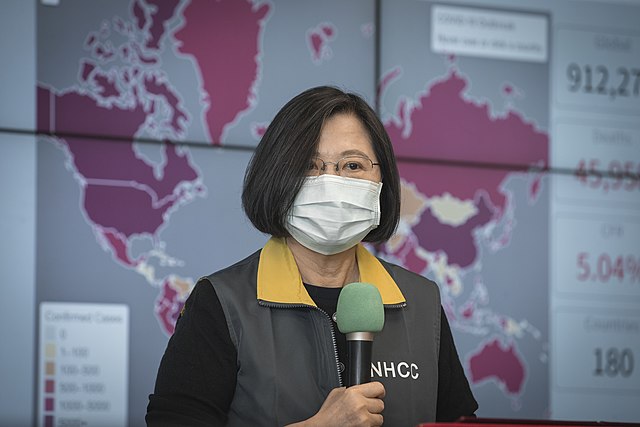
Taiwanese president Tsai Ing-wen inspects the Central Epidemic Command Center. Photo via Taiwan Presidential Office from Wikimedia Commons.
Monitory democracy
There’s another way the new ideologues and practitioners of emergency rule lead us astray. They deflect our attention from fruitful democratic alternatives to the supposed exigencies of emergency rule. In the Asia Pacific region, Taiwan and South Korea are exemplary counter-examples that show the pestilence can be handled without blindfolded institutions. Things there aren’t by any means blissful, but the early warning detector and public scrutiny methods they are using to handle the contagion lend a whole new meaning to the old Socrates adage that the unexamined life is not worth living. These governments activate the principles of ‘thinking in an emergency’ and ‘equality of survival’ (Elaine Scarry18). They constructively target the virus by making sure the contrarian spirit of opposition to arbitrary power goes viral. They practise monitory democracy.
Transparent procedures and open communication flows are the watchwords of their universal public health care systems. They ‘flatten the curve’ by openly engaging and empowering citizens to take matters into their own hands, for instance by using drive-through sites and special hospital booths (by mid-March 2020, the United States averaged 74 tests per million citizens, compared with 5200 tests per million in South Korea19). In Taiwan, where daily life goes on as usual, with relatively few infections and a handful of deaths, the government was quick off the mark in monitoring (on December 31, 2019) flights from Wuhan. It learned lessons from the 2003 SARS and 2009 H1N1 influenza outbreaks. For several years, the country stockpiled masks, sanitising agents, test kits and other equipment. The government has been open about using mobile phone location data to calculate the whereabouts of infected people, then using that data to create ‘electronic fences’ around others who may have been infected. In a world’s first, it set up a para-governmental monitory body named the Central Epidemic Command Centre (CECC). Comprising medics elected from all levels of the country-wide health care system, it provides daily briefings to citizens and shares decision making power with the Minister of Health and Welfare.
China
The working formula in these countries is that emergency rule only becomes necessary when democracy fails. We know that unregulated markets fail, but so do democracies. My Power and Humility shows that in the absence of public watchdog and barking dog mechanisms of democratic scrutiny and restraint, things usually go wrong in complex systems of hierarchical power.20 Democracy failure happens. The equation is almost mathematical: without robust accountability mechanisms, powerful state and business organisations become pea-brained. They grow unwise. Reckless delays and foolish decisions that wound the lives of citizens and spoil their environments are typically – not exceptionally – the result.
The formula most definitely applies to the People’s Republic of China. The distinguished anthropologist Liu Shao-hua points out that Beijing’s way of handling the outbreak and spread of this Great Pestilence is a straight repetition of the anti-democratic methods used to handle previous diseases such as leprosy, AIDS and SARS.21 She notes how local Party officials took charge of everything and made things much worse, initially by doing nothing. The work of brave doctors and nurses and the independent public monitoring of trends and correction of mistakes by researchers who isolated the virus in days and sequenced it quickly, were quashed. Recent official and independent reports by Chinese researchers suggest that if the Party had moved in mid-January, one week earlier than it did, then country-wide infections might have been reduced by two-thirds; and that if it had reacted three weeks earlier 95% of the country’s cases of dry coughing, raging fever, crippling lethargy and clogged lungs could have been prevented.22 This didn’t happen. Instead, political correctness and ‘saving face’ (bǎo miànzi) mixed with cynicism and unwillingness to spoil either forthcoming Chinese New Year celebrations or disrupt the Party’s ‘two meetings time’ (from January 6 to January 17, 2020) together produced a massive cover-up. Political failure triumphed. A global environmental catastrophe was triggered by mutating pathogens jumping species. The Great Pestilence was born.
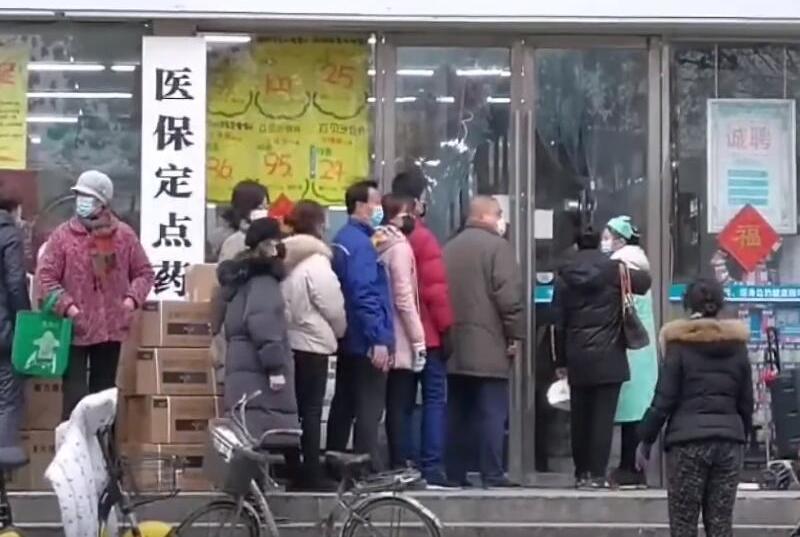
Citizens of Wuhan China standing in line outside a drug store during 2020 coronavirus outbreak. Photo from Wikimedia Commons.
When leaked reports and social media protests began revealing the extent of infection in Wuhan and surrounding areas, the Party’s upper ranks panicked. Knowing well that monkeys scatter when trees fall, and fearing rebellion, they were forced to confess, and to act. The gates of state power crashed shut. 800 million people were locked down. Economic life ground to a shuddering halt. More than 80,000 citizens were infected. 3,300 were left to die in quarantined apartments, or in overcrowded wards and make-shift hospitals. In true Party style, some top health system officials, and the Party secretaries of Wuhan and Hubei province responsible for the lies and mismanagement, were sacrificed. Like a deus ex machina, the masked despot Xi Jinping then appeared on the scene. Bit-by-bit, inside China, the disease was reportedly brought under control.
The New Despotism
Surely among the strangest and least expected outcomes of the Great Pestilence is that the country that hatched the virus looks as though it will now enjoy the technological and soft power advantages of being the first major political economy to shake it off. Nobody knows how quickly the Chinese economy can return to surpluses, or whether its future state capitalist growth model will be more equitable, greener and better focused on the well-being of its subjects. My forthcoming The New Despotism (2020) shows why the inner resilience and global staying power of China shouldn’t be underestimated.23 This pestilence may in fact be its golden moment, a second Nixon-Kissinger tipping point when without firing a shot the country takes geopolitical full advantage of the present coughing and chaos in the United States to surge ahead, to resume building its global empire, so finally shattering the illusion of American superiority.
If the tea leaves are indeed readable in this way, the People’s Republic of China would be the first big power to stand up after the world had fallen down. Dreamy hopes of expanded ‘global co-operation and trust’ (Yuval Noah Harari24) would be dashed. A tougher reality would discredit poetic talk of this Great Pestilence as the mother of fresh beginnings when whole societies ‘break with the past and imagine their world anew’ (Arundhati Roy25). Instead, the geopolitical centre of gravity of the world would finally be fixed in an Asia Pacific region led by Beijing. With the United States irredeemably weakened, and the European Union states struggling to keep up, the egalitarian ideals and power-sharing institutions of Taiwan- and South Korean-style monitory democracy would be outflanked, or ignominiously pushed and shoved aside.
For all this to happen, Chinese citizens would need to do more than band together in suffering and swear proud loyalty to their one-party regime. They would have to forget the most fundamental lesson of this Great Pestilence: where there is no open democratic vigilance of power on our ‘virus planet’ (Peter Piot) populated by trillions of minuscule virus particles waiting impatiently to hijack living cells, new pestilences will surely be born, and democratically spread, inside and outside China. Citizens elsewhere in the world would similarly need to spurn the proven principle that mutating viruses love the lack of public accountability. Better called subjects, these citizens would embrace the present-day emergency rule and, more generally, ignore the writing on democracy’s wall. Heads down, they’d need only to keep on quarantining themselves. They would ensure that in this crisis democracies become their own worst enemies. The upshot would be that Chinese-style ways of wielding power would tighten their grip on large parts of the world. A new despotism skilled at the arts of spreading voluntary servitude, what Chinese intellectuals like to call ‘good governance’ (liánghǎo de zhìlǐ), would triumphantly become a formative feature of our planet’s pestilent future. Despotism would then be the future of democracy.
This commentary was written for IWM’s blog Coronavirus: How Will It Affect Our Lives?, and the Albert Hirschman Centre on Democracy’s series of commentaries on the effects of the novel coronavirus on democratic experiences around the globe.
Alfred W. Crosby, America's Forgotten Pandemic: The Influenza of 1918 (New York 2003)
Barbara W. Tuchman,
A Distant Mirror: The Calamitous 14th Century(New York 1978
Bess Levin, ‘Texas Lt. Governor: Old People Should Volunteer to Die to Save the Economy’, Vanity Fair (24 March, 2020)
A. Subramani, ‘ICJ moves UNHRC against China for Covid-19 Reparations’, Times of India (3 April 2020); available at: https://timesofindia.indiatimes.com/india/icj-moves-unhcr-against-china-for-covid-19-reparations/articleshow/74965784.cms
Leslie Hook, ‘How coronavirus broke the US healthcare system’, FT Weekend (2-3 May 2020).
Adam Tooze, Crashed: How a Decade of Financial Crises Changed the World (Harmondsworth, 2018)
Daniel Defoe, Due Preparations for the Plague (London 1722), p. 5.
Darius Rejali, Torture and Democracy (Princeton, NJ, 2009).
John Keane, ‘Life after Political Death: The Fate of Leaders after Leaving High Office, in Paul t’Hart, John Kane and Haig Patapan (eds), Dispersed Democratic Leadership Revisited: Origins, Dynamics, and Implications (Oxford 2009), pp. 279-298.
John Keane, Democracy and Media Decadence (Cambridge and New York, 2013); and Power and Humility: The Future of Monitory Democracy (Cambridge and New York 2018).
Marshall McLuhan, Understanding Media: The Extensions of Man (London 1964), part 1, section 4
Thucydides, The History of the Peloponnesian War (Chicago 1989), pp.115-118.
Giovanni Boccaccio, ‘Day the First’, in The Decameron (London 1886).
David Runciman, ‘Coronavirus has not suspended politics – it has revealed the nature of power’, The Guardian (27 March 2020), available at: https://www.theguardian.com/commentisfree/2020/mar/27/coronavirus-politics-lockdown-hobbes
Elaine Scarry, Thinking in an Emergency (New York 2012)
John Keane, Power and Humility (Cambridge and New York 2018).
Zeng Jinyan and Liu Shao-Hua, ‘Epidemic Control in China: A Conversation with Liu Shao-hua’, Made in China Journal (22 February 2020), available at: https://madeinchinajournal.com/2020/02/22/epidemic-control-in-china-a-conversation-with-liu-shao-hua/
See the report by Shengjie Lai et. al., https://www.medrxiv.org/content/10.1101/2020.03.03.20029843v3
John Keane, The New Despotism (Cambridge, Mass., 2020).
Yuval Noah Harari, ‘The world after coronavirus’, Financial Times (20 March 2020)
Arundhati Roy, ‘The Pandemic is a Portal’, Financial Times (4 April, 2020) https://www.ft.com/content/10d8f5e8-74eb-11ea-95fe-fcd274e920ca
Published 17 April 2020
Original in English
First published by IWM blog 'Coronavirus: How Will It Affect Our Lives?'
© John Keane / The Institue for the Human Sciences / Eurozine
PDF/PRINTIn focal points
Newsletter
Subscribe to know what’s worth thinking about.
Related Articles

Viewing authoritarianism as a political trend overlooks the damage it can cause. The devastation ‘illiberal democracies’ are inflicting on cultural and media sectors show just how difficult it is to recreate something once it has been taken apart. Eurozine partners discuss ways to sustain journalism at the 32nd European Meeting of Cultural Journals.

Back on the Trump track
Topical: US Election
War, women’s rights, deportations and democracy: what’s at risk as Trump returns? Eurozine’s topical reads on what to expect of the power shift in the US.
